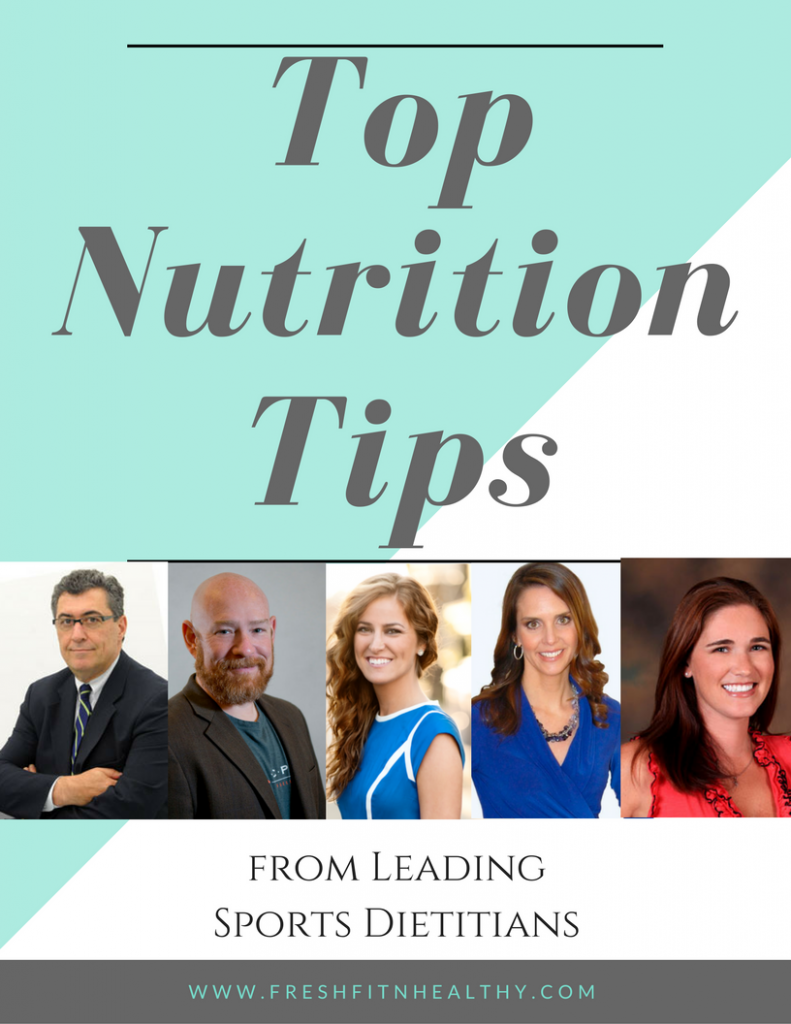Want to gain that extra competitive edge? Here are the top nutrition tips from professional sports dietitians to help you do just that.
Within the last year, I have had the incredible opportunity to meet, connect with, and even work with, some of the top, leading sports dietitians around the country. In being a dietetic intern and sport nutrition masters student who will soon be out in the field herself, I have come to look up to and admire sports dietitians like these 5 whom I’ve had a chance to connect with. Today, they are sharing their top nutrition tips!
With many of you asking me daily what some of the top nutrition tips I recommend are, whether it be over on my instagram, or youtube channel, or even snapchat (which I have LOVED to connect with you all on recently! username: sarah_grace11), I thought, ‘what would be better than to ask some of the leaders in the field what their top advice is to the athletes they work daily with?’
Even though there are many nutrition myths and fads out there related to diet and food, one thing that IS for certain is the fact that nutrition can play a key role in athletic success. When I personally began chasing the dream of running for the D1 school, the University of Florida, I began taking my nutrition seriously for once; and it made all the difference in the world. Especially when you are already an elite athlete, tweaking your diet and food intake can give you that little extra edge you’re looking for. That’s why I reached out to some of the most prestigious, professional sports dietitians in the US that work either in the NFL, MLB, NBA, or Olympics, to offer the top nutrition tips that will help you gain the competitive edge above your competition.
Owning a healthy lifestyle website and being on my way to becoming a registered dietitian myself, you may think I always have loved eating healthy. But that’s far from the truth. In high school, I went from eating nothing but Chinese food, pop-tarts, peanut butter and fluff sandwiches, and croissants, to eating meals and snacks full of whole foods like fresh fruits and vegetables, filling grains like quinoa, brown rice, and sweet potatoes, healthy fats like nuts, seeds, avocados and almond butter, and muscle-building lean protein like chicken, seafood, beans, and lean beef. I began noticing such incredible differences in both the way I felt and the way I performed in my cross country races, that I knew I was never going back to my old ways. (More on my personal story in my book I recently wrote, Chasing Freedom)
Since Fresh Fit n Healthy began, I’ve offered so many different little health tips and tricks, but today, I’m offering you something even more valuable. The sports dietitians that have shared these the top nutrition tips for you all, work with some of the most elite athletes in the country. Pretty awesome, right?? After taking the time to read the LONG email I sent them, they took time from their extremely busy schedules to send back their very own special, TOP nutrition tip.

So without further adieu, here are the top nutrition tips from some of the top professional sport dietitians around the country!
1. Mindy Black
- Jacksonville Jaguars Dietitian
- One of the biggest tips I give my athletes is that “game day nutrition” takes place over more than just “game day”. Most athletes know the importance of quality nutrition with the pre-game meal, but then don’t understand how what they eat in the days leading up to game day can affect their performance. For the days leading up to the game, diets greater than 35% total fat are not recommended due to displacing carbohydrate needs, GI distress, AND inflammation. In fact, research indicates a high fat diet 1-2 days prior to high intensity exercise tasks may IMPAIR performance & cognitive function. In addition, only 20-40% of carbohydrates used during the game are from pre-game meals, the rest are from storage in the liver and muscle. While in season, “game day nutrition” takes place EVERY day if the athlete wants to increase performance, decrease injury risk, and increase overall recovery.
- www.mindyblack.co
[tweetthis]”While in season, ‘game day nutrition’ takes place EVERY day” – Find the top nutrition tips in this post![/tweetthis]
2. Tara Gidus

- Orlando Magic Dietitian, Founder of Diet Diva
- Match your “Supply” to your “Demand” when it comes to fueling right. As an athlete, you demand a lot out of your body in both practice and competition. Supply your body with the right fuel (type and amount) before the high demand that you ask in the form of exercise. During exercise, supply your body with fluid and carbohydrate/electrolytes/amino acids as needed. Then recover from the physical demands with carbs, protein, electrolytes, and fluid within 30-60 minutes after you finish your exercise for the best chance of replenishment and injury prevention. Depending on your weight management goals, aim for the right balance of calories coming in (supply) and calories burned (demand) and remember that it’s not just about the quantity and quality of food, but the timing of getting the nutrients in.
3. Jenny WesterKamp

- Founder of All Access Internship, Sports Dietitian
- Caffeine is an effective performance aid, especially during a draining season. However, many athletes ruin a good thing by going for caffeinated soda, energy drinks, shots, highly sweetened coffee beverages, and other low-nutrient drinks to get their caffeine fix.
- In searching for the best possible source of caffeine that ALSO provides nutrition, matcha is the answer. Matcha is powdered green tea, so you consume the leaves whole (in powder form) rather than steeping in water and discarding those nutrient dense leaves. Athletes will reap the inflammation-fighting, self-esteem boosting benefits of matcha as well as performance enhancement from caffeine. Matcha has been shown to give a more “calming buzz” thanks to L-theanine, and athletes that get jitters pre-game can now benefit. Also athletes that don’t tolerate coffee (or need spoonfuls of white sugar just to get it down), can make the easy swap to a matcha drink.
- I recommend serving matcha cold with a squeeze of fresh lemon for a refreshing drink. Matcha can be added to smoothies, too!
[tweetthis]Try this RD-recommended caffeine aid to increase your performance![/tweetthis]
4. Rob Skinner

- Senior Sports Dietitian, USA Olympic Committee
- Rest and Recovery are underutilized as performance tools. Everyone wants to work harder, but harder work will only go so far. Optimizing Rest and Recovery, making it part of your training plan will mean you can work harder when you have to, like in a competition.
- Also, the biggest mistake I have seen athletes make is not practicing good nutrition. Some say good nutrition is common sense, but it isn’t common practice and you have to practice good nutrition strategies consistently to make optimal gains.
[tweetthis]Good nutrition is common sense, but it isn’t common practice -Rob Skinner @fuelingsport[/tweetthis]
5. Dr. Dan Benardot

And lastly, from the dietitian I have personally been able to work alongside with and have learned SO much from, Dr. Benardot. He provided “Ten realities to help break through common nutrition myths”. This is something I was able to hear him talk about at Georgia State University, and found it so interesting, that I wanted to include them all! I plan on explaining each reality (based on his explanations to me through our time spent together) in the future. So stay tuned through email updates by filling out this form!
- PhD, RD, LD, FACSM
- Atlanta Falcons and USA Olympic Dietitian
- REALITY 1
- Humans are amazingly effective fat manufacturing machines. Eat too much food, you make fat. Eat too little food, you lose muscle and make fat.
- REALITY 2
- Humans are always finding ways to become more energy efficient. Exercise more and we eventually find a way to burn less energy to do this exercise.
- REALITY 3
- ‘Weight’ is the wrong measure for virtually everything that it is commonly used for. It’s all about fat mass vs. fat-free (i.e., lean) mass.
- REALITY 4
- Low calorie diets are doomed to fail. Adaptive thermogenesis leads to same weight on lower energy intake, but the resultant weight has higher fat mass that makes you look bigger.
- REALITY 5
- Very high doses of nutrients (think ‘supplements’) lead to lower tissue sensitivity and greater risk of toxicity. More than enough is not better than enough.
- REALITY 6
- People who continuously eat the same few foods because they believe these foods are ‘healthy’ are at risk of malnutrition. There is no perfect food.
- REALITY 7
- There are many ways to increase insulin and make more fat besides eating refined carbohydrates (i.e., sugar), including letting yourself get really hungry and/or eating large meals.
- REALITY 8
- The body’s reaction to an inadequate energy intake is to lower the tissue that needs energy: Lean Mass (…not fat mass).
- REALITY 9
- In humans 3,500 Calories does NOT = 1 pound. Never has, and never will. Humans are not Bomb Calorimeters.
- REALITY 10
- The commonly stated “Calories-IN, Calories-OUT” paradigm does not work as commonly applied in 24-hour units. Humans have an endocrine system that reacts in ‘real time’.
———————–
There you have it, the Top Nutrition Tips from some of the leading, professional sport dietitians around our country!
I hope you enjoyed this post and all of the wisdom within it from some of the leaders in the sports nutrition field out there! A BIG thank you goes out to these 5 dietitians who gave their time in sharing this information with us all 🙂